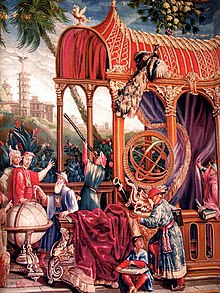Johann Adam Schall von Bell
Template:Christianity in China Portal
Johann Adam Schall von Bell | |
|---|---|
 Portrait of Adam Schall | |
| Born | 1 May 1591 |
| Died | 15 August 1666 (aged 75) |
| Scientific career | |
| Fields | Astronomy, Religion |
Johann Adam Schall von Bell (simplified Chinese: 汤若望; traditional Chinese: 湯若望; pinyin: Tāng Ruòwàng) (May 1, 1591 - 15 August 1666) was a German Jesuit missionary to China.
Born of noble parents in Cologne, Germany, he attended the Jesuit Gymnasium and joined the Society of Jesus in Rome in 1611. In 1618 he left for China, reaching Macao in 1619.
Apart from successful missionary work, he became the trusted counsellor of the Shunzhi emperor of the Qing dynasty, was created a mandarin, and held an important post in connection with the mathematical school. His position enabled him to procure from the emperor permission for the Jesuits to build churches and to preach throughout the country.
500,000 are said to have been baptized by Jesuit missionaries within fourteen years. The Shunzhi emperor, however, died in 1661, and Schall's circumstances at once changed. Astrologer Yang Guangxian alleged he indirectly caused the death of Empress Xiao Xian. Schall was imprisoned and condemned to death. The sentence was not carried out, but he died after his release owing to the privations he had endured. A collection of his manuscripts was deposited in the Vatican Library.
Crown Prince Sohyeon, the first son of King Injo of Joseon Dynasty in Korea, was highly interested in western sciences, and while he was a captive in Manchuria, visited and invited Schall to learn western sciences. Schall on his part gave Sohyeon books on the Catholic faith, and looked forward to the spread of Catholicism in Korea, since Sohyeon was the heir to the king of Korea. Schall asked Sohyeon if he would be willing to bring some Chinese Catholics so that they could proselytize the Koreans, and Sohyeon did so. Soheyon was murdered when he entered Korea, which dashed Schall's hope of evangelizing Korea.
Allegation

In 1758 was published the allegation, disputed by most Jesuits and Catholic historians, that during his final years he lived "separated from the other missionaries and removed from obedience to his superiors, in the house given him by the emperor with a woman whom he treated as his wife and who bore him two children," reported by the secretary to Monsignor Charles-Thomas Maillard De Tournon. No evidence is suggested in the work. Contemporaneous witnesses and even official Chinese documents contradict the allegations. It is stated that if true, the story would almost certainly have been reported by others who sought to discredit Schall and the other Jesuits, and that the Jesuit structure would most likely have reported the fact to authorities at higher levels of the order. The 1912 Catholic Encyclopedia suggests that the source most likely was the adoption by Father Schall of the son of a former Chinese servant and distorted.
Contribution to the Chinese Calendar
He participated in compiling and modifying the Chinese calendar then known as Chongzhen Calendar, named after the last emperor of the Ming Dynasty. The modified calendar provided more accurate predictions of eclipses of the sun and the moon.
See also
External links
References
- JOSEPH BRUCKER. The Catholic Encyclopedia, 1912, Robert Appleton Company.
- This article incorporates text from a publication now in the public domain: Chisholm, Hugh, ed. (1911). Encyclopædia Britannica (11th ed.). Cambridge University Press.
{{cite encyclopedia}}: Missing or empty|title=(help) - Alfons Väth SJ. Johann Adam Schall von Bell SJ : Missionar in China, kaiserlicher Astronom und Ratgeber am Hofe von Peking 1592-1666, 1991, Steyler Verlag Nettetal.
